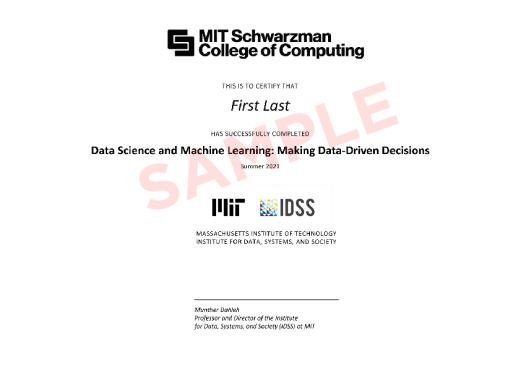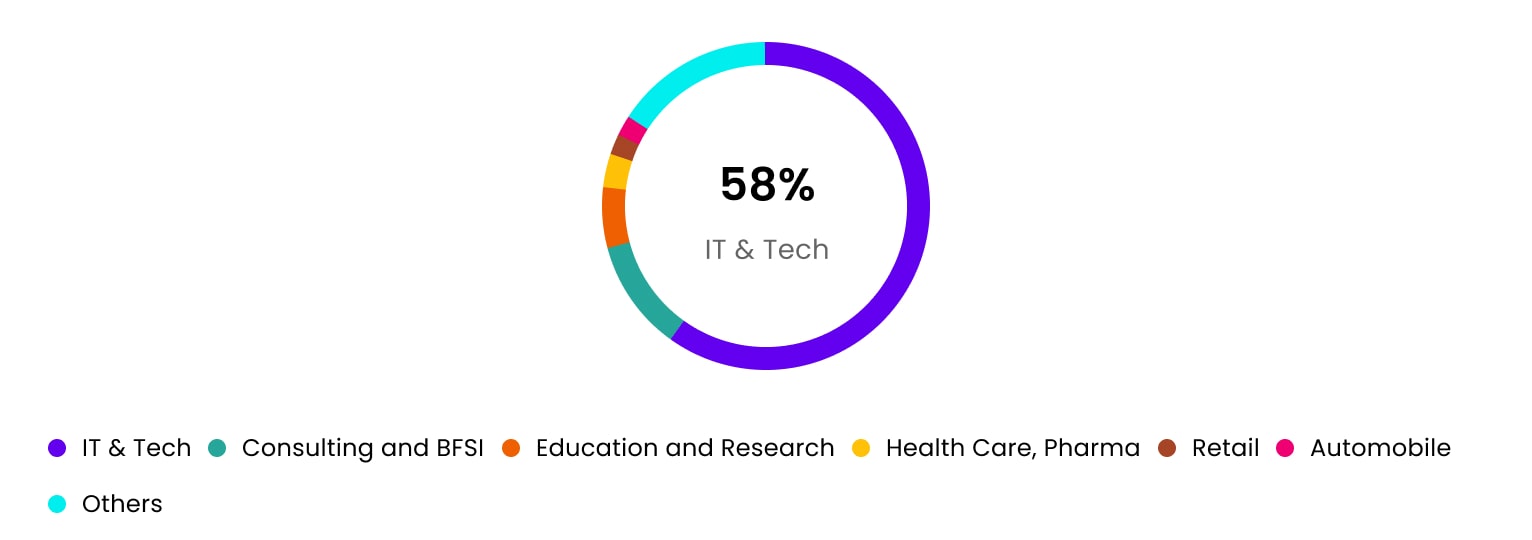Learn more about the course
Get details on syllabus, projects, tools, and more

Data Science and Machine Learning: Making Data-Driven Decisions
Build industry-valued AI, Data Science, and Machine Learning skills
Application closes 31st Jul 2025
Upskill in AI, Data Science & ML
-

Live Mentorship from Industry Practitioners
Join weekend live virtual sessions with AI, data science and machine learning professionals. Benefit from real-time guidance from experienced practitioners at global organizations.
-

Modules on Responsible AI and Generative AI
Deepen understanding of ethical AI with the Responsible AI module and explore innovations in Generative AI, covering tools, techniques, and real-world applications.
Program Outcomes
Key takeaways for career success in AI, Data Science, and Machine Learning
Designed for learners to gain hands-on experience and build industry-valued skills
Earn a certificate of completion from MIT IDSS
Key program highlights
Why choose the Data Science and Machine Learning program
-

Learn from MIT faculty
Learn from the vast knowledge of MIT AI, Data Science and Machine Learning faculty through recorded sessions.
-

Collaborative peer networking
Engage in a collaborative environment, networking with global AI, Data Science, and Machine Learning peers.
-

Build your AI, Data Science, and Machine Learning Portfolio
Showcase your AI and data science skills with 3 real-world projects and 50+ hands-on case studies in your e-portfolio.
-

Personalized mentorship sessions
Benefit from personalized weekend mentorship by experienced AI, Data Science and ML practitioners from leading global organizations.
-

Dedicated Program support
Connect with dedicated program managers to assist with queries and guide you throughout the course.
-

Generative AI Masterclasses
Get access to 3 masterclasses on Generative AI and its use cases by industry experts.
Skills you will learn
Python
Machine Learning
Deep Learning
Recommendation Systems
Computer Vision
Predictive Analytics
Generative AI
Prompt Engineering
Retrieval-Augmented Generation
Ethical AI
Python
Machine Learning
Deep Learning
Recommendation Systems
Computer Vision
Predictive Analytics
Generative AI
Prompt Engineering
Retrieval-Augmented Generation
Ethical AI
view more
- Overview
- Curriculum
- Projects
- Tools
- Certificate
- Faculty
- Mentors
- Reviews
- Fees
- FAQ

This program is ideal for
Professionals ready to advance their skills in AI, Data Science, and Machine Learning
View Batch Profile
-
Building Expertise for AI-driven Roles
Professionals looking to build expertise in AI, Data Science, and Machine Learning through hands-on projects and real-world applications.
-
Driving Actionable Insights
Individuals seeking to enhance their ability to turn complex data into actionable insights for better business decision-making.
-
Leading AI Initiatives
Professionals aiming to lead or contribute to AI and Data Science initiatives across industries.
-
Solving Business Challenges
Professionals interested in applying advanced AI techniques like Generative AI, Deep Learning, and Recommendation Systems to solve business challenges.
Program Curriculum
Developed by MIT IDSS faculty, this 12-week curriculum immerses you in today’s most cutting-edge data science and AI technologies - from machine learning and deep learning to recommendation systems, network analytics, time-series forecasting, and the transformative capabilities of ChatGPT and Generative AI.
Pre-work
Foundations of Data Science and AI
Begin your learning journey with foundational concepts in data, Python programming, and Generative AI. This is a pre module to prepare you for the advanced modules on Data Science and AI, reinforcing essential mathematical and statistical principles needed for the weeks ahead.
- Introduction to the World of Data
- Introduction to Python
- Introduction to Generative AI
- Applications of Data Science and AI
- Data Science Lifecycle
- Mathematics and Statistics behind Data Science and AI
- History of Data Science and AI
Week 0: Data Science and AI Applications
In this module, you will:
- Understand the end-to-end lifecycle of an AI application
- Analyze real-world case studies to explore business impact
- Learn how data-driven decisions are made in different industries
- Explore how AI enables innovation, efficiency, and value creation
- Prepare for hands-on learning with a strategic view of AI’s role in business
Week 1-2: Foundations of AI
This module is focussed on building your foundations of AI, you will learn:
Python for Data Science
- NumPy
- Pandas
- Data Visualization
Stats for Data Science
- Descriptive Statistics
- Inferential Statistics
Week 3: Masterclass on Data Analysis with Generative AI
In this Generative AI masterclass taken by experts, you will explore the use cases of Generative AI. Learn practical techniques to integrate GenAI into your data workflows.
Week 4: Making Sense of Unstructured Data
Supervised & Unsupervised Learning
- Understand the fundamental differences between supervised and unsupervised learning.
- Learn the key concepts of classification and clustering techniques
- Identify suitable methods based on the nature of the data and the problem context
Dimensionality Reduction Techniques
- Master Principal Component Analysis (PCA) for simplifying high-dimensional data
- Explore t-SNE for visualizing complex datasets effectively
- Learn when and why dimensionality reduction is essential for pattern recognition
- Explore the core principles and steps involved in the K-Means Clustering algorithm
- Learn how to determine the optimal number of clusters
- Understand the strengths and limitations of this algorithm in real-world scenarios
Applications and Analysis Techniques
- Discover how to identify hidden patterns in unstructured data
- Select appropriate analysis methods to solve diverse business problems
Week 5: Project Week and GenAI Masterclass
This week, you will be involved in a hands-on project focused on clustering and PCA techniques. Attend a specialized Generative AI masterclass on learning from Text Data.
- Project on Clustering and PCA
- Masterclass on Learning from Text Data
Week 6: Regression and Prediction
Classical Regression Techniques
- Understand the fundamentals of linear and non-linear regression
- Learn how to apply regression models for both prediction and inference
- Explore how regression techniques can reveal trends and forecast outcomes
Modern Regression for High-Dimensional Data
- Learn to build accurate models using high-dimensional datasets
- Apply regularization techniques like Lasso and Ridge to avoid overfitting
- Evaluate regression models using appropriate performance metrics
Causal Inference in Predictive Modeling
- Understand the principles of causal inference
- Learn to differentiate between manipulation effects and observational correlations
- Explore how to incorporate causal thinking into your regression models
Week 7: Classification and Hypothesis Testing
In this module, you will master hypothesis testing for making data-driven decisionsYou will learn classification algorithms and data categorization. Evaluate Classification Models, explore Ensemble Techniques and Decision Trees to enhance predictive accuracy and robustness.
Hypothesis Testing for Data-Driven Inference
- Explore hypothesis testing frameworks to draw meaningful conclusions from data
- Learn to make informed inferences about population parameters using statistical tests
Classification Algorithms and Data Categorization
- Understand core classification techniques used to determine class membership
- Implement algorithms for effective categorization across varied datasets
Evaluating Classification Models
- Use performance metrics such as accuracy, precision, and recall to evaluate model effectiveness
- Enhance model performance through iterative evaluation
Ensemble Learning for Robust Predictions
- Learn how combining multiple models improves accuracy
- Apply ensemble techniques like Random Forests to boost model robustness
Tree-Based Methods: Decision Trees and Random Forests
- Discover how Decision Trees structure decision-making processes
- Leverage the power of Random Forests to improve classification outcomes
Week 8: Project Week and GenAI Masterclass
This week, you will be involved in a project where you will apply your understanding of machine learning classification. Attend a masterclass on AI-powered text labeling that covers its practical implementation using Generative AI techniques.
- Project on Machine Learning Classification
- Masterclass on AI-Powered Text Labeling
Week 9: Deep Learning and Computer Vision
This week, you will explore the fundamentals of Deep Learning, the concept of neurons and Artificial Neural Networks (ANNs) function. This module will also introduce you to Computer Vision and CNN Architecture and Transfer Learning.
- Introduction to Deep Learning
- The Concept of Neurons
- Artificial Neural Networks (ANNs)
- Introduction to Computer Vision
- CNN Architecture and Transfer Learning
Week 10: Recommendation Systems
This module of data science and machine learning program will introduce you to Recommendation Systems, Statistical and Machine Learning approaches. You will explore Collaborative Filtering Techniques and learn to enhance recommendation accuracy using Data Science techniques.
Introduction to Recommendation Systems
- Understand the purpose and real-world applications of Recommender Systems
- Explore how personalization enhances user satisfaction and engagement
- Gain experience in designing recommendation pipelines using real-world datasets
- Build scalable and efficient Recommender Systems through practical exercises
Statistical and Machine Learning Approaches
- Learn basic statistical techniques for generating recommendations
- Apply Machine Learning algorithms to predict user preferences
Collaborative Filtering Techniques
- Dive into user-based and item-based Collaborative Filtering
- Understand how user behavior and preferences drive model performance
Personalization and Pattern Recognition
- Discover common design patterns and frameworks used in recommender engines
- Learn how to enhance recommendation accuracy using Data Science techniques
Week 11: Ethical and Responsible AI
This week will introduce you to the ethical implications of AI by exploring concepts such as bias, causality, and privacy. Learn about the AI lifecycle, feedback loops, and interdependencies to ensure responsible and fair AI system development and deployment.
- Introduction to AI Lifecycle
- Introduction to Bias and Its Examples
- Introduction to Causality and Privacy
- Interconnections and Domains
- Interdependency and Feedback in AI Systems
Week 12: Project Week
This week, you will involved in a project based on Recommendation Systems using real-world data.
- Project on Recommendation System
Self-Paced Modules
This Data Science and Machine Learning program will help you deepen your expertise through these self-paced modules:
Networking and Graphical Models
Explore methods for analyzing and modeling complex networks using graphical models to understand interactions and correlations.
Predictive Analytics
Master techniques for building accurate predictive models from temporal data, including feature engineering and model evaluation.
Prompt Engineering
Learn to design effective prompts and techniques for interacting with large language models.
Generative AI Development Stack
Learn how to build Generative AI solutions using the latest tools, models, and components in the modern AI development stack.
Projects and Case Studies
The program follows a learn-by-doing pedagogy, helping you build your skills through real-world case studies and hands-on practice. Below are samples of potential project topics and case studies you will work on.
-
3
hands-on projects
-
50+
case studies
Languages and Tools covered
-

Python
-

NumPy
-

Keras
-

Tensorflow
-

Matplotlib
-

Skitlearn
Earn a certificate of completion from MIT IDSS
Certificate from the MIT Schwarzman College of Computing and IDSS upon successful completion of the program
-

World #1
MIT ranks #1 in World Universities – QS World University Rankings, 2025
-

U.S. #2
MIT ranks #2 among National Universities – U.S. News & World Report Rankings, 2024–2025

* Image for illustration only. Certificate subject to change.
Program Faculty
Program Mentors
Interact with dedicated and experienced industry experts who will guide you in your learning and career journey
Course fees
The course fee is 2,500 USD
Invest in your career
-

Learn from world-renowned MIT IDSS faculty and top industry leaders
-

Build an impressive portfolio with 3 projects and 50+ case studies
-

Get personalized assistance with a dedicated Program Manager from Great Learning
-

Earn a certificate of completion from MIT IDSS and 8.0 Continuing Education Units (CEUs)
Third Party Credit Facilitators
Check out different payment options with third party credit facility providers
*Subject to third party credit facility provider approval based on applicable regions & eligibility
Application Process
-

1. Fill application form
Apply by filling a simple online application form.
-

2. Application Screening
A panel from Great Learning will review your application to determing your fit for the program.
-

3. Join program
After a final review, you will receive an offer for a seat in the upcoming cohort of the program.
Batch start date
-
Online · 9th Aug 2025
Admission closing soon
Frequently asked questions
What is the Data Science and Machine Learning course from the MIT Institute for Data, Systems, and Society (IDSS)?
The Data Science and Machine Learning program, designed by the MIT Institute for Data, Systems, and Society (IDSS), aims to help professionals develop a strong foundation in Machine Learning, Data Science, and AI. This 12-week online program follows a modular structure with a comprehensive curriculum that covers both foundational and advanced concepts, enabling learners to make data-driven decisions effectively.
It is ideal for those looking for top-tier Data Science and Generative AI courses that combine academic rigor with practical application.
Why should I choose this Data Science and Machine Learning online course by MIT IDSS?
Here are the reasons why you should choose this MIT IDSS Data Science and Machine Learning program:
Globally Recognized Institution
Offered by the MIT Institute for Data, Systems, and Society (IDSS), part of the #1 globally ranked university (QS World University Rankings 2025).
Designed by MIT Faculty
Curriculum created and delivered by award-winning MIT faculty, the global pioneers of Data Science and Artificial Intelligence.
Comprehensive & Future-Focused Curriculum
The curriculum covers advanced topics in Machine Learning, Data Science, Ethical and Responsible AI, and emerging areas like Generative AI, making it one of the most relevant programs in today’s tech landscape.
Hands-On, Real-World Learning
The program includes over 50 case studies and three real-world projects that help you apply concepts to real-world business scenarios.
Personalized Mentorship from Industry Experts
Benefit from personalized weekend mentorship sessions with senior professionals from top tech companies, helping you deepen your understanding.
Career-Aligned for Working Professionals
Perfect for those looking to transition into AI and Data Science roles or upskill to advance within their current organization.
MIT Certificate
Earn a professional certificate from the MIT Schwarzman College of Computing and IDSS.
Flexible online Format
Learn at your own pace through recorded lectures, hands-on labs, and weekend sessions tailored for busy professionals.
Delivered in Collaboration with Great Learning
Get dedicated learner support from program managers from Great Learning to assist with queries and guide you throughout the course.
What is the ranking of the Massachusetts Institute of Technology (MIT)?
According to the QS World University Rankings 2025, the Massachusetts Institute of Technology (MIT) is ranked #1 globally. The university is also ranked #2 in Best Global Universities in the U.S. News & World Report 2025-2026.
What are the key outcomes of the MIT Data Science certificate program?
With this MIT IDSS Data Science and Machine Learning program, the learners will:
- Gain practical knowledge of AI, data science, and ML
- Solve complex real-world problems using ML techniques
- Explore applications in NLP, computer vision, and recommendation systems
- Understand Responsible AI and Generative AI concepts
Will I receive a transcript or grade sheet after completing the Data Science and AI course at MIT IDSS?
Data Science and Machine Learning is an online professional certificate program offered by MIT IDSS (Institute for Data, Systems, and Society) in collaboration with Great Learning. Since it is not a degree or full-time program offered by the university, there are no grade sheets or transcripts available for this program from the university.
You will receive marks on each assessment and module to test your understanding and determine your eligibility for the certificate. Upon successful completion of the program, i.e., after completing all the modules, you are issued a certificate from the MIT Schwarzman College of Computing and IDSS.
What is the required weekly time commitment?
Each week involves:
- 2 hours of recorded lectures
- An additional 2 hours of hands-on sessions every weekend for 7 weekends, which include hands-on practical applications and problem-solving.
Learners typically spend 8–12 hours per week, which includes recorded sessions, weekend live mentorship, and self-study.
How will my performance in the course be assessed?
This MIT IDSS Data Science and Machine Learning online program is comprehensive and follows a continuous evaluation system. You will be assessed through a combination of continuous assessments, including quizzes, assignments, case studies, and project work.
Is it mandatory to bring my laptop?
Yes, you will be required to bring your own laptops. The necessary technology requirements shall be shared during registration.
What is the duration of this MIT Data Science and Machine Learning professional certificate course?
The duration of the MIT IDSS Data Science and Machine Learning program is 12 weeks, and it includes recorded lectures from award-winning MIT faculty, over 50 real-world case studies, and three industry-relevant hands-on projects.
Who will teach this MIT Machine Learning and Data Science course for working professionals?
This program is taught by MIT faculty members who have several years of experience and are highly recommended. In addition to teaching faculty, the program also features highly skilled industry mentors who guide you through hands-on projects via live and personalized mentoring sessions.
What languages and tools will I learn in this AI and Data science course?
You will master the most in-demand languages and tools during this Machine Learning and Data Science program, including:
- Python
- NumPy
- Keras
- TensorFlow
- Matplotlib
- Scikit-Learn and others.
What is unique about the curriculum of this MIT Machine Learning and Data Science course?
The curriculum of this Data Science and Machine Learning program stands out for the following reasons:
Developed by renowned MIT faculty
Leading MIT faculty crafted the curriculum to teach learners industry-relevant Artificial Intelligence, Data Science, and Generative AI techniques and apply them to real-world problems.
Covers core Data Science and Machine Learning
The curriculum includes essential tools and techniques to deal with complex real-world business scenarios. Learners will also explore critical concepts of Deep Learning and Neural Networks and the process of applying them to areas like Natural Language Processing (NLP) and Computer Vision (CV). The curriculum also teaches learners the theory behind Recommendation Systems and their application to diverse sectors.
Focus on Generative AI and Responsible AI
The program features dedicated modules and masterclasses on Generative AI and Responsible AI, enabling learners to stay ahead in the evolving AI landscape.
Hands-on Learning Approach
Learners apply theoretical knowledge through 3 hands-on projects and 50+ case studies, building a strong portfolio to demonstrate their skills.
Flexible Format
The 12-week structure includes recorded lectures from MIT faculty and live weekend sessions with industry experts, ideal for working professionals.
What is the role of Great Learning in delivering this program?
This program is delivered in collaboration with Great Learning. As an education collaborator, Great Learning supports learners throughout their journey by providing access to experienced industry mentors, program support teams, and live personalized mentorship sessions. Great Learning also facilitates learner engagement, offers career guidance, and ensures a seamless learning experience aligned with the high academic standards set by MIT IDSS.
Is the program completely virtual?
Yes, the program has been designed keeping in mind the needs of working professionals. Thus, you can learn the practical applications of Data Science and Machine Learning from the convenience of your home within an efficient 12-week duration.
What certificate will I receive after completing the MIT Data Science and Machine Learning course for working professionals?
Upon successfully completing this program, you will secure a Certificate of Completion, “Data Science and Machine Learning: Making Data-Driven Decisions,” from MIT IDSS.
What is the eligibility criteria for this MIT IDSS Data Science and Machine Learning course?
The eligibility criteria for this program are as follows:
- Working professionals like early-career professionals or senior managers (IT Managers, Business Intelligence Analysts, Data Science Managers, Management Consultants, and Business Managers) who want to apply Data Science and Machine Learning techniques in their firms.
- Working professionals like Data Scientists, Data Analysts, or Business Analysts who wish to turn vast volumes of data into valuable insights
- Entrepreneurs interested in innovation with the assistance of Data Science and Machine Learning techniques
- Those with academic or professional training in Applied Statistics or Mathematics will find the program easier to learn. However, participants lacking this background will need to put in extra effort, and Great Learning will offer the required assistance.
What is the deadline to enroll in this Data Science and Machine Learning course from MIT IDSS?
The applications follow a rolling process, which is closed when the requisite number of seats in the cohort is filled. To ensure your chances of securing a seat, we encourage you to apply as early as possible.
What coding skills are needed to be a Data Scientist?
Complex algorithms and sophisticated tools make up a large part of a Data Scientist's day. In addition to data analysis tools, keeping up with the latest tools in data acquisition, data cleansing, data warehousing, and data visualization is becoming increasingly important as the historically separate roles of Data Scientist and analyst become merged for increased efficiency.
Python is the lingua franca of Data Science, but knowledge of R, SAS, SQL, and sometimes Java, Scala, and Julia, among others, must also be acquired at the foundational level itself. Technical soundness is a must for moving forward toward solutions while avoiding roadblocks.
What is the registration process to pursue this online MIT Data Science and Machine Learning professional certificate course?
To enroll in this program, the applicants must meet the eligibility criteria mentioned earlier. The standard registration process for the eligible students is as follows:
Step 1: Applicants will need to complete their online application form.
Step 2: On receiving the application, the Great Learning program team will review it to determine your fit with the program.
Step 3: If selected, you will receive an offer for the upcoming cohort.
Step 4: Secure your seat by paying the fee.
What is the program fee?
The total program fee is USD 2500.
Are there any additional charges for purchasing books, virtual learning materials, or license fees?
No. All the requisite learning material is provided online to learners through the Learning Management System (LMS). Considering these fields are vast and constantly evolving, there is always more you can learn, and there will be a list of suggested books and other resources for your in-depth reading enjoyment.
What are the payment options for registering for the online Data Science and Machine Learning course from MIT IDSS?
Candidates can pay the program fee through Bank Transfer and Credit/Debit Cards. They can also pay in easy installments using PayPal credit options and get interest-free payments for up to 6 months (Note that these services are subject to credit approval by PayPal).
[For further details, please get in touch with us at
dsml.mit@mygreatlearning.com]
What is the refund policy?
Please note that submitting the admission fee constitutes enrollment in the program, and the cancellation penalties outlined below will be applied. If you are unable to attend your program, please review our dropout and refund policies below:
Dropout requests received within 7 days of enrollment and more than 42 days prior to the commencement of the program will incur no fee. Any payment received will be refunded in full.
Dropout requests received more than 42 days prior to the program but more than 7 days after the acceptance are subject to a cancellation fee.
Dropout requests received 22-41 days prior to the commencement of the program are subject to a cancellation fee equal to 50% of the program fee.
Any dropout requests received fewer than 22 days prior to the commencement of the program are subject to a cancellation fee equal to 100% of the program fee.
No refund will be made to those who do not engage in the program or leave before completing a program for which they have registered.
Can my employer sponsor the program fee?
We accept corporate sponsorships and can assist you with the process.
[For more information, please write to us at
dsml.mit@mygreatlearning.com]
How much salary can a Data Scientist and Machine Learning Specialist earn?
The salaries in the fields of Data Science and Machine Learning consistently exceed USD 100,000 annually. According to ZipRecruiter, the average salary in the U.S. for
- Machine Learning Engineer is USD 128,000
- Data Scientists is USD 122,000
The demand for AI, Machine Learning, and Data Science jobs spans a wide range of industries, including Healthcare, Cybersecurity, Finance, Oil & Gas, Transportation, Education, Talent Acquisition, Inventory Management, and E-commerce, particularly in areas like Recommendation Systems and Price Optimization.
As organizations increasingly adopt AI and data-driven decision-making, professionals skilled in Data Science, Machine Learning, and Generative AI are in high demand. These roles offer strong opportunities for career growth, leadership roles, and long-term industry relevance.
How to become a Data Scientist?
To become a Data Scientist, you need to have a blend of technical expertise, analytical thinking, and real-world problem-solving skills. While a strong academic background is a plus, you should have the ability to master the essential tools and techniques of the field.
Here’s how you can get started:
- Build a strong foundation in mathematics, statistics, and programming, especially in languages like Python and R.
- Gain hands-on experience with tools and frameworks used in the industry, such as TensorFlow, Scikit-learn, and SQL.
- Develop applied knowledge through projects that simulate real-world data challenges in domains like healthcare, finance, and retail.
- Strengthen your understanding of AI and machine learning techniques, including supervised and unsupervised learning, deep learning, and generative AI.
One of the effective ways to build these skills is to enroll in a professional certificate course from MIT IDSS, which can significantly boost your career prospects in Data Science and Artificial Intelligence.
What is the demand for Data Scientists?
Data Science roles have been among the most in-demand job roles in recent years. According to LinkedIn, hiring for Data Scientists saw a 46% increase in the last year. Employment of data scientists is projected to grow 36 percent from 2023 to 2033, significantly faster than the average growth rate for all occupations.
We are well within the era of Big Data, where decision-making drives innovation across industries, fostering business growth. Whether it’s personalizing your Netflix recommendations or shaping public policies, Data Science and Machine Learning are at the core of it all. However, raw data alone isn’t enough; skilled professionals are needed to transform data into actionable insights. That’s why companies around the world are actively hiring Data Scientists and Machine Learning experts, and nurturing a strong culture of analytics within their teams.
If you’re looking to build a future-proof career, now is the time to upskill in Data Science, AI, and Machine Learning.
What is the future of Data Science?
The future of Data Science is promising. It’s already reshaping how businesses operate. Organizations that leverage Data Science effectively are seeing measurable benefits across multiple areas, such as:
- Reducing operational costs
- Identifying new market opportunities
- Targeting the right customer segments
- Measuring marketing effectiveness
- Launching better products and services
Data has become one of the most valuable assets for modern businesses. In fact, Gartner predicted that 90% of corporate strategies would highlight data and analytics as essential business capabilities.
As industries increasingly rely on data to drive innovation and growth, the need for skilled Data Science professionals will only continue to rise. Gaining expertise in Data Science, Artificial Intelligence, and Machine Learning is a smart investment for you to future-proof your career.
What is Machine Learning?
Machine Learning refers to a group of techniques used by data scientists that allow computers to learn from data. It is the underlying process that allows machines to learn from data, resulting in the recommendations and predictions you receive from Alexa. From leisure to work, our lives are made easier with Machine Learning. The responsibilities of a Machine Learning specialist encompass a spectrum that extends from creating Machine Learning models to retraining systems.
Specialization in Machine Learning involves acquiring the necessary tools and techniques for the most crucial subset of AI. A holistic skill set, therefore, consists of exceptional technical skills as well as an inherent learning attitude.
What is Data Science?
Why Data Science and Machine Learning?
The advancement of technology in various fields contributes significantly to the growth of industries. Hence, many businesses are using advanced Machine Learning and Data Science applications to draw the best outcomes. Let's explore some of the benefits of these rapidly evolving technology domains.
Building Better Business Strategies
By employing Data Science and Machine learning, organizations can develop the best business plan. Data Science and Machine learning provide solutions to develop the best business plan that supports companies' exponential growth. Today, most top-notch companies are applying Data Science and Machine learning in projects and operational management to achieve better outcomes.
Better Research and Inventions
Organizations must be conscious of the latest trends in their market. A data-driven business team would shape its business in the best way that suits the requirements of end customers. It would stay current with technological trends and develop a business strategy that delivers the best services. Businesses with a clear vision and expertise in data can develop groundbreaking solutions. Data-backed approaches enable businesses to add value to their products by adapting to the latest market trends and incorporating the latest technology.
Cost Reduction
Cost reduction is one of the major benefits that Data Science and Machine Learning contribute to any business. Small and medium-sized companies strive for endurance due to limited budgets and resources. Data Science, AI, and ML help in formulating cost-effective business solutions.
Delivered in Collaboration with:
MIT Professional Education is collaborating with online education provider Great Learning to offer Data Science and Machine Learning: Making Data-Driven Decisions. This program leverages MIT's leadership in innovation, science, engineering, and technical disciplines developed over years of research, teaching, and practice. Great Learning collaborates with institutions to manage enrollments (including all payment services and invoicing), technology, and participant support. Accessibility
Batch Profile
The Data Science and Machine Learning class consists of working professionals from excellent organizations and backgrounds maintaining an impressive diversity across work experience, roles and industries.

Industry Diversity

Educational background




 Speak with our expert
Speak with our expert


































